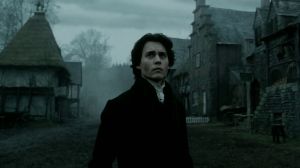Horror is a favorite genre for a lot of people, but within it, there’s gothic horror — the subgenre that always finds a way back into the spotlight. And it’s not hard to see why. These stories don’t rely on jump scares or predictable tropes; they build everything through heavy atmosphere, mysterious characters full of secrets, and striking settings that practically act as supporting players. It’s the kind of horror that grows slowly and gets under your skin through suggestion rather than action. And when it’s done right, it pulls you in because it feels more psychological and unpredictable. Instead of just scaring you, it gives you that lingering sense that something is very wrong, and you don’t know what, but you need to find out. Before you realize it, you’re already in too deep.
Videos by ComicBook.com
And the best part is that when these films really deliver, it becomes almost impossible not to revisit them from time to time. Have you ever stopped to wonder which ones truly stand out? Here are 7 brilliant gothic horror movies every fan should know and rewatch. This list is all about productions that are atmospheric, full of personality, and perfect for viewers who love horror that doesn’t underestimate the audience.
7) Frankenstein (2025)
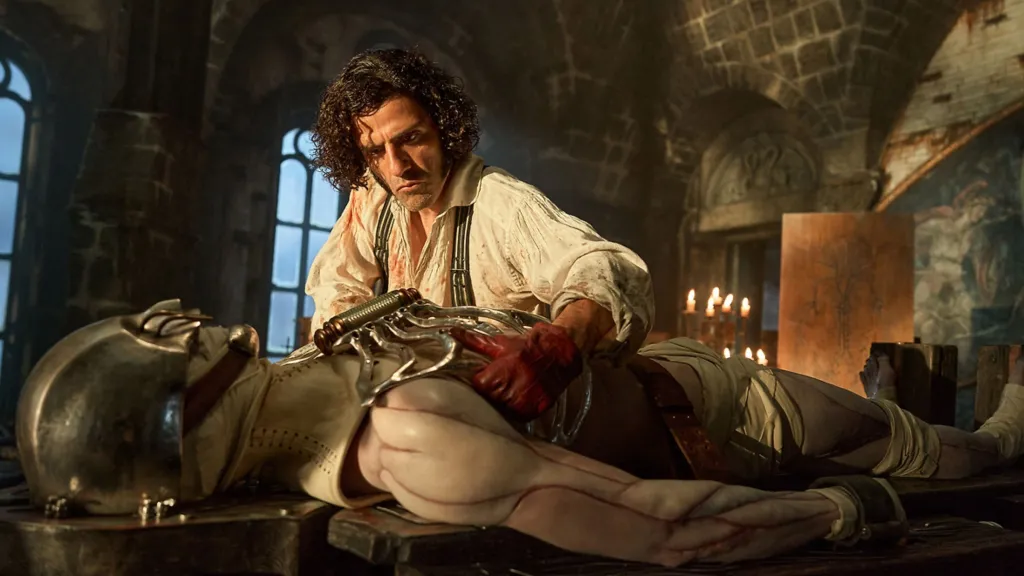
Guillermo del Toro is one of the true masters of horror, especially gothic horror. But with Frankenstein, he manages to outdo himself by taking Mary Shelley’s classic and shaping it into something that fits his voice perfectly. It’s not just about gorgeous visuals, but about story and character. The plot follows Victor Frankenstein (Oscar Isaac), who wants to play God, and his creation (Jacob Elordi), who isn’t just a monster by definition, because he feels, suffers, and questions his place in the world. Del Toro keeps the dark atmosphere but gives space for drama and moral conflict (something many adaptations skip). In the end, the movie stays dark, but with a richer (and smarter) emotional core.
What really makes this Frankenstein worth watching and rewatching is how it builds tension and empathy at the same time. Every scene with the creature reinforces both the tragedy and the horror behind creating artificial life. The production design, cinematography, and score also stand out, all working together to build a heavy, immersive world that perfectly supports the story. And the dynamic between creator and creation gives the film an emotional punch that helps it stand out among the many previous adaptations. It’s the kind of movie that deserves to be revisited by every generation for how brilliantly it approaches the material.
6) Nosferatu (2024)
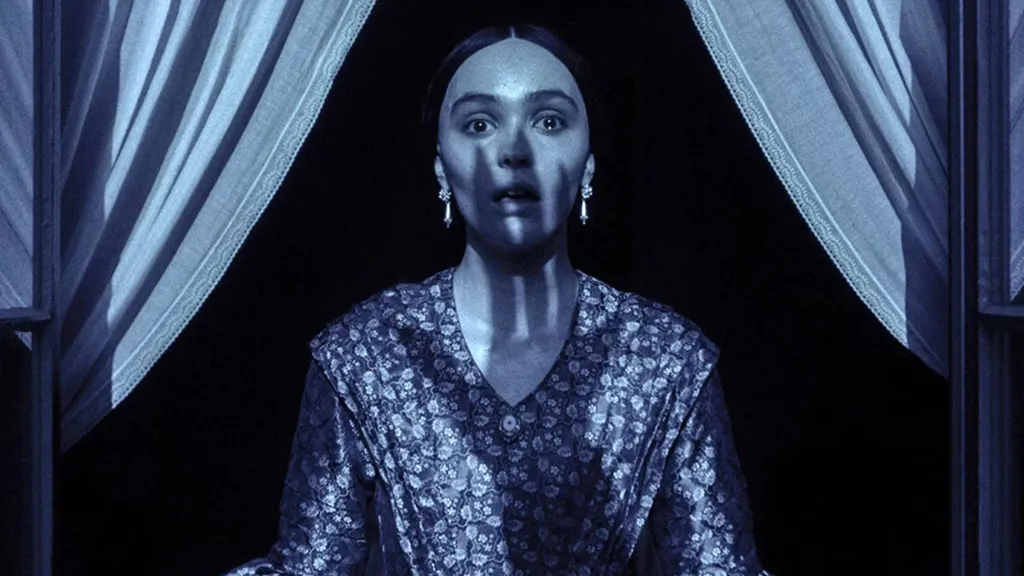
Vampires are some of the most beloved creatures in cinema, and while multiple versions of this story have appeared over the years (not to mention a brilliantly meta reinterpretation), it was the remake of the original that really broke through and grabbed mainstream attention. Nosferatu is one of Robert Eggers’ strongest films because it does something bold: it takes the gothic horror of 1922 and makes it unbearably tense. Count Orlok (Bill Skarsgård) isn’t elegant or seductive — he’s grotesque, predatory, and genuinely terrifying. The story follows Ellen (Lily-Rose Depp), who becomes the vampire’s target, and the sense of danger never lets up. Yes, the film has jump scares, but it’s the gothic atmosphere and silence that do the heavy lifting.
And the cool thing is that this is one of those movies where you notice new details every time you rewatch it. The cinematography, production design, and pacing all work in its favor, and they make it clear that this new version of the vampire isn’t ordinary or comparable. The horror in Nosferatu comes from the inevitable — the slow pursuit and the total helplessness in the face of a monster that remains one of the most iconic figures in horror fiction. It’s visually striking, emotionally heavy, and a great example of how gothic horror can feel modern without losing its classic roots.
5) Sweeney Todd: The Demon Barber of Fleet Street
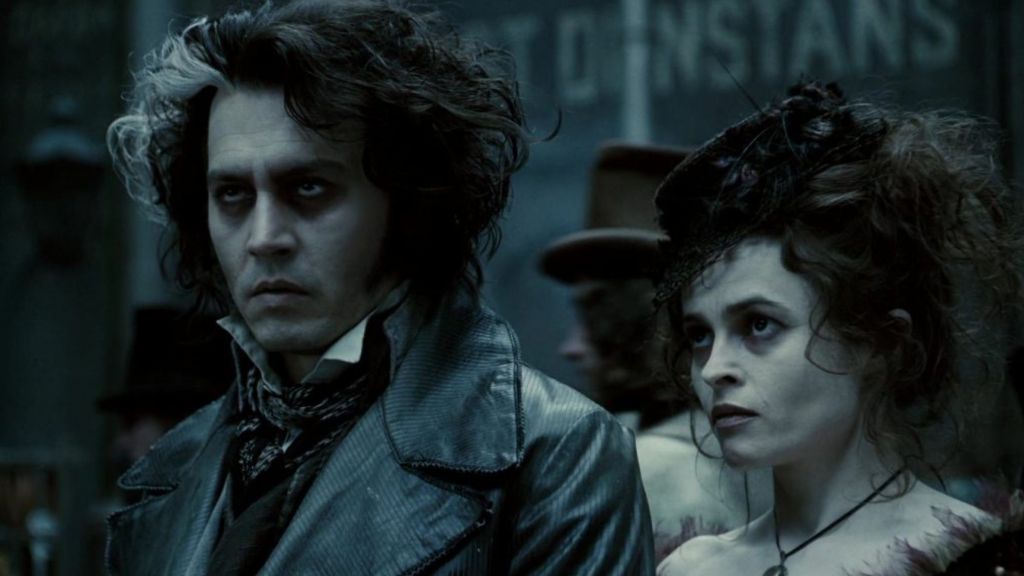
Tim Burton is another major director who understands the gothic style better than almost anyone. Out of all his films, one that truly stands out (and that almost nobody forgets) is Sweeney Todd: The Demon Barber of Fleet Street — an adaptation of a story that’s appeared on screen and on stage multiple times. Told as a musical, the plot follows barber Sweeney (Johnny Depp), who returns to London to get revenge on the man who destroyed his life. And with every murder, the bodies go straight to Mrs. Lovett (Helena Bonham Carter), who turns them into meat pies. But what makes this version so spectacular? It’s how Burton turns the city and the barbershop into full-on horror settings: the grime, the fog, and the harsh lighting work to make you uncomfortable. It’s not exactly scary, just incredibly eccentric and unmistakably gothic.
Sweeney Todd never loses intensity, and it’s so good that even people who aren’t into musicals feel compelled to keep watching just to see how far the story goes. The violence is almost choreographed, yet it still lands as shocking (even with the musical’s strange sense of elegance), and the protagonist’s melancholic tone makes you feel like you’re watching a tragedy, not just entertainment. It’s the kind of movie you can rewatch over and over and still catch new details in the production design and pacing — the elements that make it genuinely immersive.
4) Sleepy Hollow
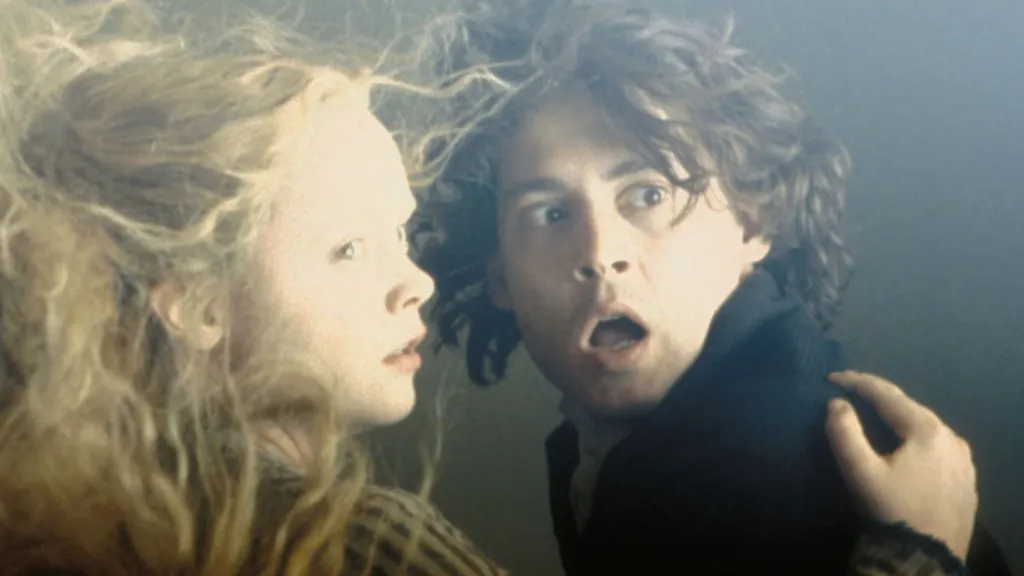
Another Burton production, but one that’s totally underrated and deserves way more credit, is Sleepy Hollow. This reimagining of the famous Headless Horseman legend still works incredibly well today. In the story, constable Ichabod Crane (Depp) arrives in a small village to investigate a series of mysterious murders, only to realize the real terror comes from more than just a horseman: the town’s superstition and paranoia are almost as threatening as any monster. Burton builds a filthy, dark, and menacing version of Victorian London, and it makes all the difference. The gothic atmosphere never lets up.
But the real strength here is how every scene feels designed to steadily increase the tension. The setting relies on a carefully crafted aesthetic — twisted trees, heavy fog, and massive shadows — and every element works together to make you feel trapped in that village right alongside the protagonist. It’s a very dark blend of visuals and pacing, and the narrative is smart enough not to lean on scares. That technical precision makes the story stronger, because it keeps feeding the doubt about what’s actually going on: Is it supernatural? Human manipulation? Or is Crane simply losing control of everything? With Sleepy Hollow, it genuinely feels like Burton was at the peak of his creativity.
3) Interview with the Vampire
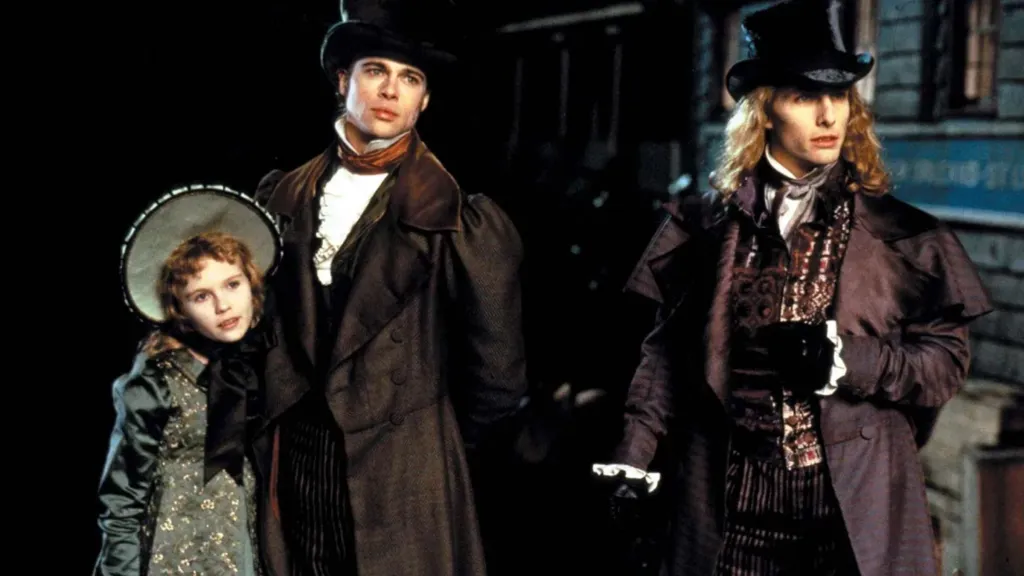
This is where gothic meets drama. Interview with the Vampire is a classic of the vampire genre, adapted from Anne Rice’s novel. The story follows the vampire Louis (Brad Pitt) as he gives an interview to journalist Daniel Molloy (Christian Slater) about how he was turned into a creature of the night by Lestat (Tom Cruise). The entire film plays as a flashback that dives into loneliness, guilt, and obsession with far more intensity than your typical monster movie. To give an idea, the plot also includes the secondary storyline of Claudia (Kirsten Dunst), a child stuck in an immortal body, dealing with things no child should ever face. It’s a more emotional, contemplative kind of gothic (even though it has its violent moments).
Interview with the Vampire is one of those films that’s worth revisiting every now and then, because it’s not just about vampires killing people; it’s about the human experience through characters who never age and can’t escape their own choices. It’s an introspective narrative that pulls you into their world with surprising ease, showing exactly why immortality can be terrifying even when it doesn’t look like it. It’s a film that rewards rewatching because there are always new emotional and thematic details to pick up on as time goes by.
2) The Innocents
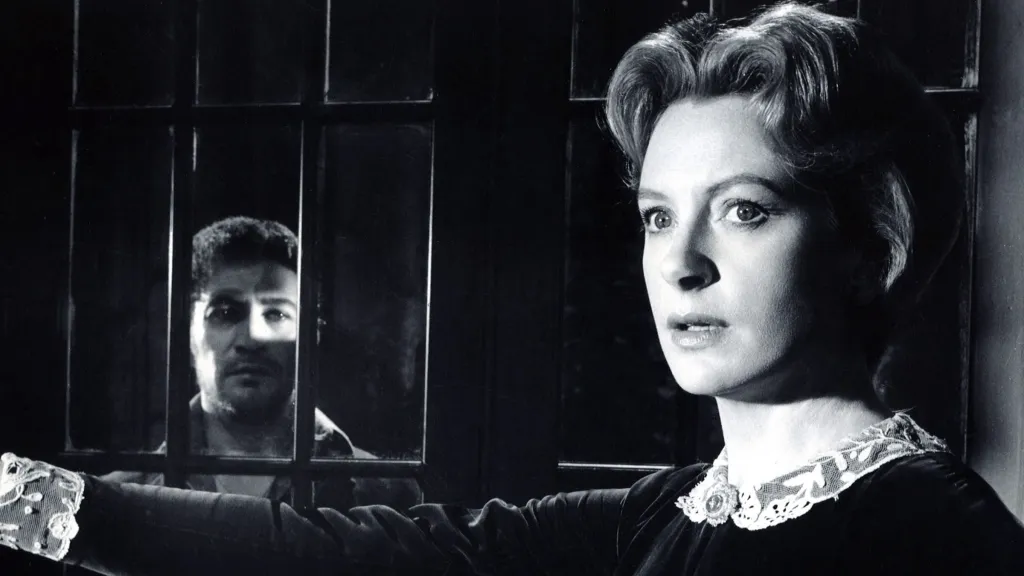
The Innocents is an absolute classic of psychological gothic horror, and the way it builds fear through small details is incredible. The story follows governess Miss Giddens (Deborah Kerr) as she arrives at a manor to care for two children, but little by little, she starts to suspect they’re being possessed by ghosts. The film’s biggest strength is that it never makes it clear whether the horror is real or just happening in her mind, which naturally keeps the tension rising nonstop. And the setting plays a huge role too: the house feels alive, claustrophobic, and like any small mistake could spiral into disaster.
And it’s interesting how the film manages to pull the audience in emotionally without having to explain everything (which is a huge plus when you consider how many movies today rely on overly expository scripts). The interactions between characters are ambiguous enough that you start questioning who’s actually in control — and that ambiguity is what gives the film its power. You don’t get answers easily, which makes the gestures, silence, and looks carry even more weight. The Innocents keeps growing over time precisely because it never hands over its mystery completely. It’s pure gothic horror that relies on atmosphere and psychology, not special effects or clichés.
1) The Others
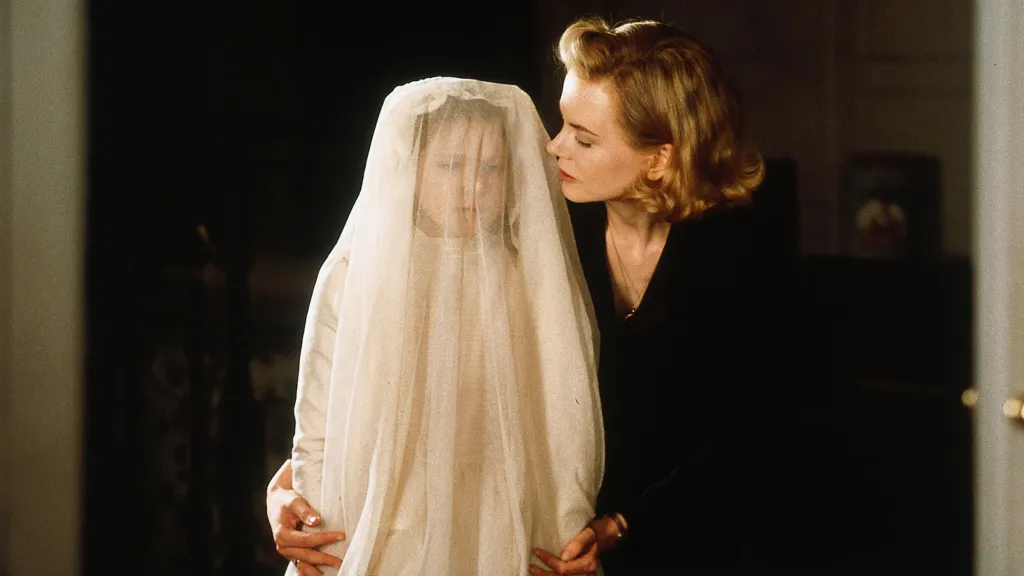
A timeless classic, The Others is arguably the most effective example of modern gothic horror: elegant, atmospheric, and crafted with a level of precision that very few films in the genre can sustain. The premise might sound a bit similar to The Innocents, and that’s not exactly accidental. Both feel almost like they’re in conversation with each other, which is why this one absolutely belongs on the list. The story follows Grace (Nicole Kidman), an overprotective mother raising two children with extreme photosensitivity in a house that reacts strangely to the presence of supposed intruders. But the script pulls that simplicity apart piece by piece until it becomes clear the threat was never what it seemed. Kidman also plays the lead with a rare balance of fragility and rigidity, carrying everything almost entirely on her own.
In this story, nothing shows up by accident. The strict rules of the house, Grace’s obsessive need for control, the cryptic behavior of the new servants — everything feels like preparation for an emotional collapse waiting to happen. And when the twist finally hits, it doesn’t land as a shock but as the inevitable solution to a carefully built puzzle. The Others‘ power lies in its tight narrative control, its chillingly gothic atmosphere, and that sense that something is wrong long before you understand what it is. Besides, it also goes far thanks to a mix of elements, like its cinematography, which shifts from comforting to unsettling in seconds, and its sharply constructed character arc.
Got a favorite from this list? Is there another gothic horror you’d call a full-on masterpiece? Let us know in the comments!

